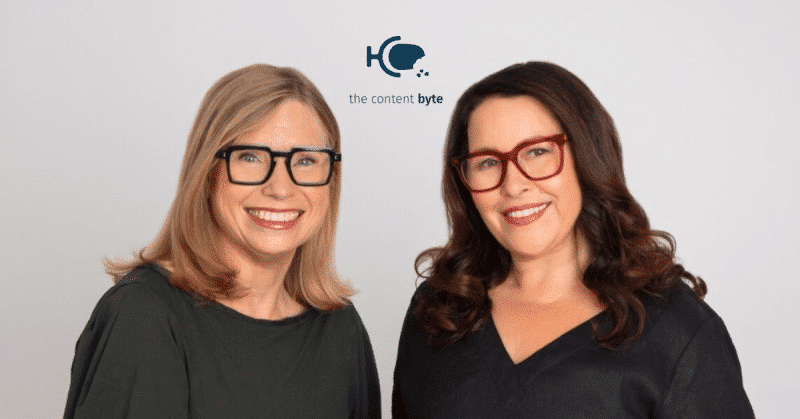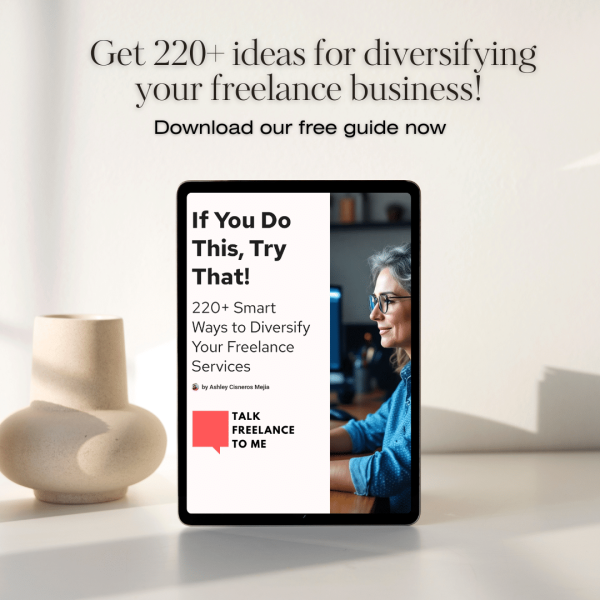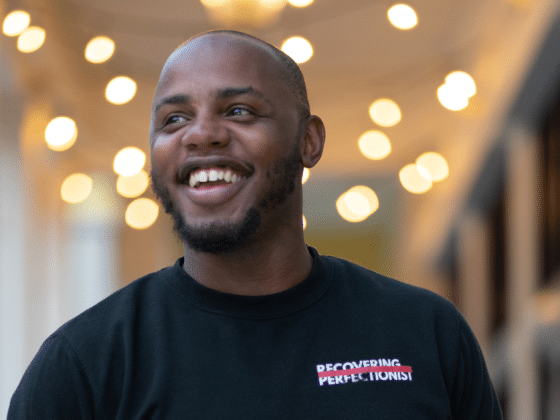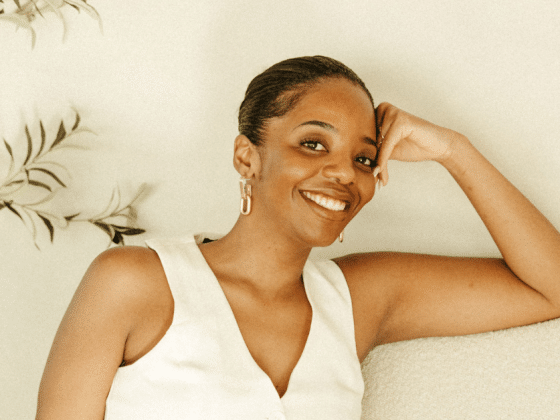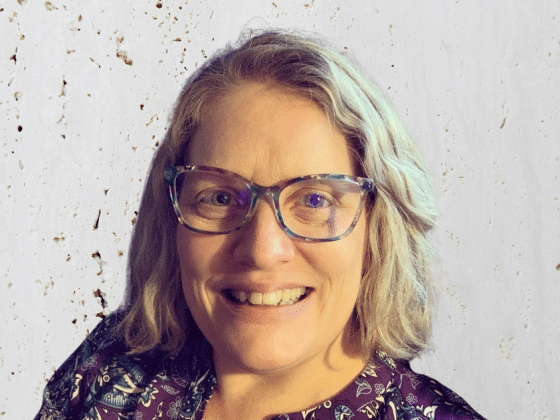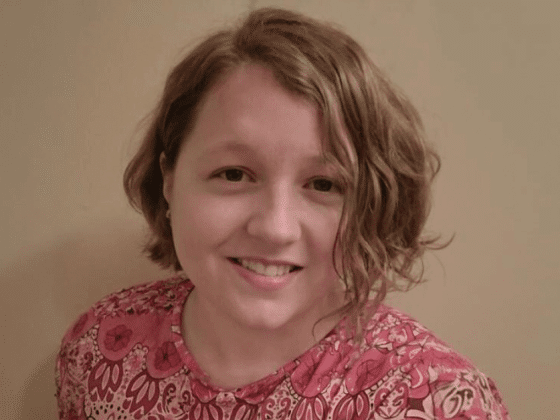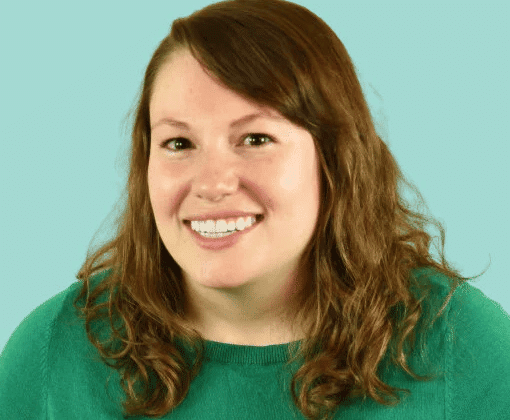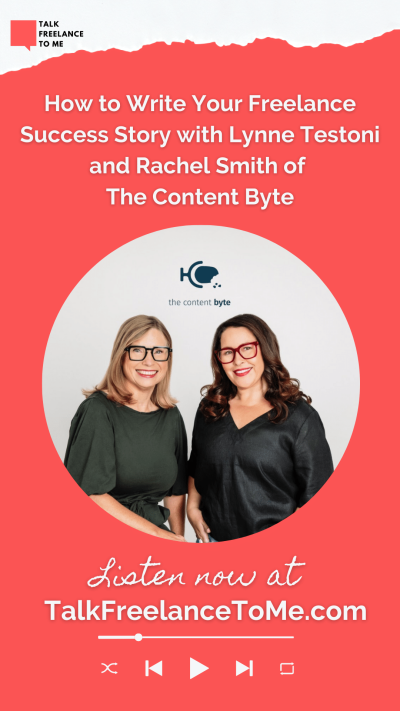
Click the player above to listen to the episode. Or listen on your favorite podcast app! We’re on all major podcast platforms including: Amazon Music, Apple Podcasts, Spotify, YouTube Music, and iHeart Radio, to name a few. You can also watch the interviews on our YouTube channel.
Table of Contents
- What happens when a simple idea between colleagues grows into a multiple-year force in the freelance world?
- Time Stamps
- About Rachel Smith
- About Lynne Testoni
- About The Content Byte Podcast
- About Rounded
- Noteworthy Quote From This Episode
- Listen Now
- Watch This Interview on YouTube. Subscribe Here!
- Diversify Your Freelance Business
- Let’s Get Social
- Read The Transcript
- Opportunities That Came From The Podcast
- Dividing Roles, Respect, and Creative Disagreements
- Sponsorship, Rounded, and Covering Podcast Costs
- Building A Media Kit For Your Freelance Podcast
- Rachel’s List, Community, and The Power Of Podcasting
- Stage Experience, Confidence, and Showing Up
- Creating The Content Byte Summit
- Ripple Effects: Books, Masterminds, and Career Growth
- Legacy, Freelance Careers, and Many Paths To Success
- How The Podcast Supports Their Freelance Businesses
- Advice For Collaborating As Freelancers
- Where To Find The Content Byte And Your Hosts
What happens when a simple idea between colleagues grows into a multiple-year force in the freelance world?
Two powerhouse Australian creatives. Seven years of podcasting wisdom. One honest conversation about building something that lasts.
In this episode of The Talk Freelance To Me® Podcast, host Ashley Cisneros Mejia sits down with Rachel Smith and Lynne Testoni, co-hosts of The Content Byte and long-time champions of Australia’s freelance community. What started as a simple idea has grown into a seven-year journey filled with collaboration, community building, and a ripple effect that has touched writers around the world.
Rachel and Lynne share how they turned a casual “we should try a podcast” moment into a platform that has shaped careers, sparked masterminds and book deals, and opened doors none of them expected. They unpack the realities behind a long-running show—everything from strengths-based collaboration and guest selection to sponsorships, systems, and creative disagreements handled with respect.
You’ll hear the behind-the-scenes story of The Content Byte Summit, their two-year live event that brought freelancers together in a way that reshaped the community. They talk openly about what they learned, the real costs, the joy of bringing global speakers to Australia, and the unexpected connections that kept growing long after the conference ended.
This conversation digs into how to choose the right collaborator so you can avoid mismatched expectations, and why community-centered content often leads to stronger, more sustainable opportunities.
Rachel and Lynne pull back the curtain on what long-term podcasting really looks like behind the scenes and show how being generous with your knowledge can strengthen the freelance ecosystem as a whole. They also share the surprising career wins that came directly from the podcast and talk about using your work as a way to build a meaningful legacy over time.
No matter where you are in your creative journey, this episode reveals how far you can go when you partner with someone who complements your strengths and stay grounded in serving the people who rely on your work.
Tune in for an inspiring, candid conversation full of practical insight, real stories, and a refreshing reminder that collaboration can take your work further than you ever imagined.
In this episode, you’ll learn:
- How Rachel and Lynne built a sustainable seven-year podcast without losing sight of their own businesses
- What to look for in a creative collaborator so the partnership actually works
- How to divide responsibilities based on strengths—not ego or assumption
- The real costs of running a long-term podcast and how sponsorship kept theirs going
- Why community-centered content expands your reach more effectively than self-promotion
- How their annual summit sparked books, masterminds, and career breakthroughs for attendees
- Ways to gather listener feedback when podcast metrics fall short
- How hosting a podcast elevated both of their brands and brought in new clients
- What it takes to create a legacy in the freelance world through service, generosity, and skill-sharing
Time Stamps
2:43 — Meet Lynne Testoni and Rachel Smith, hosts of The Content Byte Podcast
3:51 — How Lynne and Rachel started the podcast, their partnership, and initial challenges.
7:12 — The impact of The Content Byte Podcast: Building relationships, collaborations, and community.
8:51 — How Lynne and Rachel divide podcast responsibilities and handle creative disagreements.
13:03 — Sponsorship: How they secured a sponsor, what’s included in their media kit, and lessons learned.
19:12 — Community building: The crossover between Rachel’s List and The Content Byte, and the value of podcasting for community engagement.
22:11 — The personal side: How podcasting has made Rachel more visible and connected.
24:11 — Lynne’s experience with public speaking and how it shaped her podcasting style.
26:17 — The Content Byte Summit: Deciding to host live events, lessons learned, and the impact on the community.
29:00 — Ripple effects: Books, masterminds, and careers sparked by the summit and podcast.
32:00 — Personal and professional growth: How co-hosting has helped Rachel and Lynne, and what’s next for them.
36:00 — Advice for collaborations: Choosing the right partner, dividing responsibilities, and starting small.
About Rachel Smith
Rachel Smith is a veteran Australian journalist, copywriter, and community builder who has dedicated her career to helping freelancers carve out sustainable, profitable paths in a changing industry. As the founder of Rachel’s List—a long-standing hub connecting writers with paid opportunities—and co-host of The Content Byte podcast, she shines a light on the many ways creatives can reinvent their skills and build resilient careers. Rachel is known for her practical teaching style, her commitment to community, and her belief that freelancers can thrive when they’re supported, informed, and willing to chart their own course. Visit Rachel’s site here: https://rachelsmith.com.au/
About Lynne Testoni
Lynne Testoni is an Australian freelance writer, editor, and content creator with more than 20 years of experience in interiors, design, building, and food. She works with leading brands to produce human-centered content, from case studies and white papers to blogs, home features, and cookbook projects. With an Executive MBA and a strong track record as a speaker and trainer, Lynne regularly teaches freelancers about pricing, diversifying their work, and building sustainable careers. She is also the co-host of The Content Byte podcast and co-founder of The Content Byte Summit, which brings together freelancers and creatives from across Australia. Visit her site here: https://www.lynnetestoni.com/about-me
About The Content Byte Podcast
The Content Byte is a weekly podcast for people who use their words to make a living, hosted by Sydney journalists Rachel Smith and Lynne Testoni. Each Monday they run interview-style conversations with writers, editors, and creatives about freelancing, content work, and the realities of the #writerslife. With more than 200 episodes, over 100,000 downloads, and a spot in the top 2.5% of podcasts globally, the show has become a trusted go-to for practical advice and honest stories from inside the industry. Listen and subscribe here: https://thecontentbyte.com/
About Rounded
Rounded is the official sponsor of The Content Byte Podcast and a leading Australian accounting platform built specifically for freelancers. Known for its simple, intuitive tools for invoicing, expenses, and tax-time prep, Rounded partners closely with Rachel’s List and The Content Byte to support Australia’s growing freelance workforce. Their long-running collaboration has expanded into a formal partnership focused on practical resources, educational content, and community initiatives designed to help freelancers get paid faster, stay organized, and run financially confident businesses. Learn more here: https://rounded.com.au/
Noteworthy Quote From This Episode
“There are so many stories of people who’ve struck out and found a new path, transferring their skills in a new way that still helps them make money and pay the mortgage.”
Rachel Smith
Listen Now
Click the player above to listen to the episode. We’re also available on all major podcast platforms including: Amazon Music, Apple Podcasts, Spotify, YouTube Music, iHeart Radio, Podcast Addict, and Deezer. You can also find all episodes on our Buzzsprout page and watch our interviews on our YouTube channel. Get more info about our freelance podcast here.
Watch This Interview on YouTube. Subscribe Here!
Diversify Your Freelance Business
Discover 220+ freelance service ideas to diversify your income using the skills you already have. This free guide helps writers and creatives expand into new offers, niches, and formats—without starting from scratch. Get your diversification guide here.
Let’s Get Social
Love the podcast so far? Rate and review us if you use Apple Podcasts and join in the freelance conversation on Instagram, Facebook, TikTok, Twitter/X, and YouTube! You can also connect with Ashley on LinkedIn and check out our boards on Pinterest!
Read The Transcript
This transcript has been lightly edited using AI for clarity and length.
Origin Story: How The Content Byte Began
Ashley Cisneros Mejia: Hello and welcome everyone to another episode of the Talk Freelance To Me Podcast. I’m your host, Ashley Cisneros Mejia, and today I am thrilled to welcome two ladies I have admired for years, both as writers and as fellow podcasters.
Today we are really honored to welcome Lynne Testoni and Rachel Smith of The Content Byte.
Ladies, thank you so much for joining all the way from Australia.
Rachel Smith: Thank you. It is lovely to be here. It is so exciting to be here. Thanks, Ashley.
Ashley Cisneros Mejia: Absolutely. I’ve been listening to your podcast for a long time. I heard about your big Content Byte Summit, I think it was in 2023, and a couple of other writers in our space were just gushing about how wonderful it was and all the creative freelancers they met when they traveled there to attend.
I’m such a fan. Lynne, I want to talk to you about the origin story of you two. You’ve been doing this podcast for a while now. Can you take us back to that moment?
What sparked the conversation for you to join forces and create The Content Byte?
Lynne Testoni: We have been doing it for seven years now, so it has been a while. It is a hungry beast, doing weekly episodes for seven years.
I do not think either of us knew it would become this big, but it has been great. To be honest, I bullied Rachel into doing it.
Podcasting seven years ago was the new thing. Like a lot of content creatives, I thought, “I want to see what this is about.” Doing something for yourself is a great way to learn how it works.
You can then do it for clients if you want, or just keep it as your own project.
There is a really strong community here for Australian freelancers, and I had been a member of Rachel’s List for many years. Rachel already had the audience. I had a few friends, a few colleagues, my mum, that sort of thing, but not a big audience.
Rachel had a well-established audience of freelance writers and creative freelancers. We had worked together before. I had been her commissioning editor and she had written for me at various magazines.
I knew she was professional and lovely to deal with, so I basically bullied her into it. We started in a small way. Rachel’s husband, Phil, did our audio at first, and then it just grew from there.
Rachel Smith: Yes, she did bully me. I was very reluctant because I had two businesses on the go.
Adding another element to that, I was unsure. We are going to talk about the summit later, but she bullied me into that too.
She is the driving force, which is probably the nicer way of saying it, behind a lot of the things we decide to do. We do discuss everything and make decisions together, but she often pushes us to move.
Lynne Testoni: I felt there was an opportunity. Honestly, I did not think it would go on for as long as it has or be as wonderful as it has, but it has been a great journey.
We were sort of colleagues, but now we are really good friends. We knew each other socially, had lots of friends in common, and knew each other professionally, but we had never worked this closely together.
It was a bit of a risk, but it has worked out really well.
Ashley Cisneros Mejia: It seems like it has paid off in a big way. That “bullying” worked.
Lynne Testoni: Maybe I should say “gentle encouragement.”
Ashley Cisneros Mejia: We can spin that. I love that.
Opportunities That Came From The Podcast
Ashley Cisneros Mejia: Rachel, you’ve been doing this for seven years now. If it hadn’t worked, you would not have kept going this long.
Can you tell me about an opportunity or connection that happened because of the podcast that would not have happened without The Content Byte?
Rachel Smith: There are so many that it is hard to pinpoint them all. It is difficult to choose only one.
I think it has helped both of us build deeper relationships with amazing people we would not have had a chance to talk to otherwise. With that has come incredible wisdom for us as freelance writers and business owners.
We have learned so much that we have taken into our own freelance businesses. I have taken a lot of it into Rachel’s List.
We had Bernadette Schwerdt on, who runs a fantastic copywriting community, and she invited me to do webinars for her community. That was one clear opportunity.
I got to know people I admired, like Sarah Howard. She was a job poster at Rachel’s List initially and is now someone I consider a friend. She has been on the podcast, spoke at the summit, and now we are cooking up things for Rachel’s List together.
We mentioned off air Sarah Greenburg, who came on the podcast to talk about content strategy. I am now in her doodle drawing group on Slack and keep up with her on LinkedIn.
I have also been on other people’s podcasts, like Martin Sully, Ed Gandia, Kim Curtin, and Jen Donovan. We have talked about everything from Rachel’s List and community building to marketing and freelance writing.
All of these friendships and connections leapfrog into other collaborations.
It has also brought new people to Rachel’s List to post jobs and hire freelancers. Overall, it has created a collaborative support network around me and Lynne, and that continues to grow and compound for the podcast, Rachel’s List, and our own freelance businesses.
Dividing Roles, Respect, and Creative Disagreements
Ashley Cisneros Mejia: Lynne, you mentioned you bullied Rachel into this. Any group project, especially a creative one that has your name on it, requires decisions about who does what.
In terms of putting on a podcast for seven years, how do you divide the work? And if there are creative disagreements, how do you handle them?
Lynne Testoni: First of all, you have to start with mutual respect.
I had great respect for Rachel because I had worked for her. I knew she was good at her job as a writer, and I really liked the way she ran Rachel’s List. That strong foundation matters.
When we started, we did not really know what was involved. We thought we would just turn up with a mic and record.
Of course, it has grown and evolved, and we have leaned into our strengths. We are both strong writers, but we work differently. I think maturity and respect help us honor how each of us works best.
For example, I am a morning person. I do my best writing in the morning. Rachel is an evening person and gets creative after nine o’clock at night. She is famous for sending emails at midnight.
I send them at 7 a.m. That works because I rarely read emails after five or six unless it is an emergency, and I do not expect her to respond at 7 a.m.
I do all the finances for the podcast and manage the budget, and I am happy doing that. Rachel is much stronger on Canva and social media, so she has evolved into handling more of that.
We both use our contact books. We have been doing freelance writing and content work for a long time, so we have a lot of contacts. We keep a shared Google spreadsheet where we throw everything in.
So Rachel does a lot of the marketing, and I do a lot of the business side. We have just naturally moved into the roles that match our strengths and preferences.
Rachel Smith: We have slowly learned over the years. There are definitely things we could have done differently that would have helped with repurposing content, and we have talked about that a lot.
But when you are six years in, it is hard to go back. So instead we keep trying to find new ways to improve.
We created a pitching document. You saw it, Ashley, because you came on our podcast. Guests upload a photo and give us a few angles or topics they want to discuss.
We both come from a journalistic background, and that structure came from a pitch someone once sent us. It was almost like a magazine pitch, and it blew our minds.
We thought, “Imagine if we asked everyone to do that.” It really elevated our episodes instead of us flying blind.
Now we have everything in one place: the bio, the photo, the angles we can choose from.
We started a newsletter, which has helped. We have created lead magnets too, which have brought more people to the podcast and the freelance community around it.
Regarding creative disagreements: because Lynne does more content and I do more copywriting, sometimes one of us suggests a guest and the other is not convinced they are the right fit.
So we pitch the guest to each other. We ask, “Why would this person be good? Why would our freelance audience care about this guest?”
We are very clear on who our audience is, what they want to hear, and what they want from us and our guests. There is a lot more collaboration in that process than we expected when we first started bringing on guests.
We also recently did a listener survey. It has been interesting to see how people view the guests and topics we choose, and we are learning a lot from that.
Getting feedback from podcast listeners is hard. You probably know that too, Ashley.
Lynne Testoni: I agree. We know which episodes do well in terms of numbers, but we often do not know why.
We do not know if it was the guest, the topic, the timing, or whether that guest promoted the episode heavily or not at all. The survey helps clarify some of that.
Rachel Smith: We work really well together, and we have clearly defined roles.
When someone asks that question, it makes us realize we have created a structure and system that works for us and still lets us run our own freelance writing businesses.
Sponsorship, Rounded, and Covering Podcast Costs
Ashley Cisneros Mejia: I appreciate the foundation of respect you have for one another. You can hear it in how you talk about your origin story and your listeners. You are intentional about who gets through the door and how you vet guests.
As a podcaster myself, I know there are many costs associated with running a show. How do you support the financial side of creating The Content Byte?
Lynne Testoni: The best thing we did was get a sponsor about three years ago. They are an accounting platform that specializes in freelancers, which is such a good fit for our audience of freelance writers and creative freelancers.
Rachel already had a great relationship with them through Rachel’s List, and we built on that. It has gone really well.
It means we can outsource some of the work. We have a wonderful editor. We pay for transcripts. The sponsorship does not really cover our time, but it covers those external costs, which makes the whole thing much more manageable.
Rachel Smith: It is a unique setup, because our sponsor, Rounded, also sponsors Rachel’s List and has a separate deal there.
We combined the sponsorship deal for the two businesses, which is a bit unusual. It works well because they get access to two communities of freelancers who need them.
It has been a great arrangement for them, and for us.
Lynne Testoni: Rachel had never done a sponsorship agreement before, but I had as a magazine editor, pitching and working with advertisers.
We pulled together a value document and media kit. That was a good learning experience, and I have used that template in other parts of my business.
Hearing what a sponsor needs and how we can deliver value has been useful in other areas of our freelance work, including the conference.
Building A Media Kit For Your Freelance Podcast
Ashley Cisneros Mejia: You mentioned a media kit. For listeners who are not sure how to develop one, what did you include in that document?
Rachel Smith: I created the media kit in Canva. We have updated it recently for this year, and we will probably update it again next year.
We also had a photo shoot done this year, our first in six years. That took some gentle pushing from Lynne too, because I never wanted to do a photo shoot.
It turned out to be amazing.
The media kit outlines a bit about us, mini bios, and some stats we have for the podcast. We use Listen Notes, which tells us we are in the top 2.5 percent of podcasts globally and shows our score and verification.
We also include download numbers, which are over 100,000. Sponsors like those metrics.
They also want to know the value they receive: how many mentions they get, how often we read ads, where they will be placed.
We explain that we do live reads, we mention them at the top and tail of the episode, we mention them in the Facebook group, and we give them space in our newsletter and in The Content Byte wrap-ups.
Quantifying that reach is helpful so they know how many people they will get access to and how often over a year.
They give us talking points for the live reads, and then we put it into our own words in a way we know will land with our freelance audience.
Lynne Testoni: I do not think everyone understands that a media kit is not just, “This is us, we are wonderful.”
It is: “This is what you get if you pay us. Here is the practical value.”
Rachel Smith: If someone wants to put together a media kit for a freelance podcast, I think it needs photos of you and possibly key guests, clear social proof, statistics, and your bios.
The last page of our media kit is sponsorship prices and the packages we offer.
It is a really useful asset to have ready. If a sponsor suddenly shows interest and you do not have a media kit, you can end up scrambling.
So it is worth putting together before you start pitching.
Ashley Cisneros Mejia: Fantastic. Shout out to Rounded. We will include a link, because if they are supporting freelancers and solopreneurs in Australia, we need to know about them.
Rachel’s List, Community, and The Power Of Podcasting
Ashley Cisneros Mejia: You mentioned community earlier in relation to Rachel’s List. Rachel, I want to hear more about that.
You have an amazing place where people looking for freelancers can find talent, and where freelancers can find opportunities. How did building that community tie into what you are doing with The Content Byte?
Rachel Smith: Rachel’s List and The Content Byte draw slightly different audiences, but there is a lot of crossover.
In our freelance circles, people tend to face the same challenges: finding clients, raising their rates, having the right skills for the future, and dealing with AI.
Those are universal issues across both businesses. The Content Byte is a separate business from Rachel’s List, but they overlap.
Before we started the podcast, people mostly saw me in the Facebook group or on an online masterclass. The podcast has helped people get to know me and get to know both of us, which is important when you run a community of freelance writers.
It has also been a free way for people to learn. We hear over and over from the Rachel’s List community how much they love the podcast.
We bring lots of members from Rachel’s List on as guests. It is lovely to highlight those freelance writers and give them some extra visibility for their businesses.
There is so much untapped wisdom inside communities. We love that the podcast is a vehicle for helping other people and learning from them.
It is a two-way street.
Lynne Testoni: One funny thing we discovered was that people knew Rachel’s List more than they knew Rachel as a person.
People were surprised there was actually a person called Rachel running Rachel’s List.
The podcast has given a face to her name and to the community. It has made it all more personal.
Podcasts are very intimate. People listen to them like they are overhearing a conversation.
People often say they feel like they know us, even if we have never met, because they have heard us chat.
We have an informal style.
Rachel Smith: That is true. We have only had a couple of people say that we laugh too much, and we have never tried to stop that.
Ashley Cisneros Mejia: That is hard to control when you are having a real conversation.
Stage Experience, Confidence, and Showing Up
Ashley Cisneros Mejia: Lynne, you have done a lot of public speaking, teaching, and training. How has your stage experience influenced your style on the podcast?
Lynne Testoni: That is a great question, because I had not really thought about it.
I think it is part of the reason I was not as scared about podcasting as Rachel was.
This started because I was a magazine editor. Here in Australia, we used to joke about “wheeling out the editor.”
I did lots of presentations to advertisers and readers. Sometimes I presented to management as well.
I also did many radio interviews about the magazine and a regular radio segment once a week with a local radio personality.
All of that built confidence.
So podcasting did not worry me. The more you do, the more confident you get. It is just practice.
When you start a podcast, hardly anyone is listening for the first few weeks or months. If you really mess things up, it does not matter much.
Maybe some people go back to those early freelancing episodes and I cringe a bit, but mostly you realize you improve over time. You learn by doing.
The podcast has opened new doors. I did a TEDx talk. I have moderated small events and panels, including at our own summit, and I have presented at other places.
People have asked me to run workshops, all because of the podcast. It has come full circle.
Creating The Content Byte Summit
Ashley Cisneros Mejia: Let’s talk about the summit. You ran it two years in a row, which is very exciting.
The idea that people can come and experience the freelance podcast in real life, have an immersive experience, and meet you in person is so cool.
How did you decide to host it, and what did you learn from that process?
Rachel Smith: I remember the moment we decided to do it. We were on a plane coming back from another event we had both attended.
We thought, “Let’s give it a crack.”
It was a quick, sudden decision. We had to move fast because we did not have much time to get everything ready, promote it, and sell tickets.
You have to lock in speakers, build the website, and then sell tickets in a tight window.
I think we decided in November and did a lot of work in January.
Lynne Testoni: January is summertime in Australia, so things are a bit quieter. We did a lot of the planning and scoping work then.
Rachel Smith: The biggest thing it taught me is that online gatherings are great and the learning is powerful, but getting people together in person to learn and network is a game changer.
I did not realize how huge that part would be.
I am really proud of the conferences. They were a huge amount of work and came with a big financial cost to us.
But they brought people to the stage who blew everyone’s minds with what they taught. There was so much generous wisdom shared.
I never thought I would meet people like Ed Gandia, Jennifer Goforth Gregory, or Austin Church in person. The Australian speakers were brilliant too.
Many of them have stayed in our ecosystem: Steven Lewis, Sarah Howard, Brook Hill, Lindy Alexander, Susan Reoch, and others.
There were countless great moments.
It is a shame it is such a big undertaking, because both events were magical and they still live on for people in different ways.
Lynne Testoni: It was lovely to bring in people we wanted to listen to ourselves. There was some selfishness there, in a good way.
We thought, “Wouldn’t it be great to have the people we listen to on freelance podcasts, like Ed Gandia, come to Australia and share their skills and wisdom more widely?”
That part was very satisfying.
Rachel Smith: Ed was unsure of us at first. He was thinking, “Who are these two Australian women trying to get me to fly to Australia?”
Lynne Testoni: That was funny.
There is also something special about meeting your audience in person. Rachel mentioned earlier that you do not always know who your audience is when you are podcasting.
So many people came up to us and said they listened every week. It humanized us for them, and for us.
A couple of the presenters had never spoken to an audience that size before. We coached them through it, which was really rewarding.
They were clever and had great wisdom to share, and we helped them learn how to share it on a panel or as a speaker.
Rachel Smith: We helped fix some presentations too, or helped presenters refine them. We coached them into delivering incredible talks, even when they were nervous and the slides were not quite right at first.
That part was fun as well.
Ripple Effects: Books, Masterminds, and Career Growth
Ashley Cisneros Mejia: That is powerful. What a gift to the presenters to workshop with both of you.
You are literally passing the mic to other creators.
Rachel Smith: It was possibly a control move too, because we curated everything carefully. We knew exactly what we wanted on the day, so we had to get it right with everyone.
We were very specific and thorough in our briefing process.
Lynne Testoni: We wanted to make sure it was a conference without fluff, with lots of practical takeaways.
We wanted people to leave with their brains buzzing, thinking, “Wow, I learned this and that, and I can use it in my freelance writing or content business.”
We know it sparked at least five books. There were masterminds that formed where people met and decided to work together, and a few new freelance careers evolved from that.
Ashley Cisneros Mejia: Talk about a ripple effect.
There is no shortage of fluff out there. People need real “how to” and application. I can see why people are still asking you to bring it back.
You have probably had many moments over seven years where you thought, “We are creating something special here. We are making an impact.”
Can you share some of those moments? Lynne, let’s start with you.
Lynne Testoni: There are so many. We have definitely boosted some people’s careers by having them on the podcast and then seeing them go on to run workshops or grow their own platforms.
People like Lindy Alexander. She is remarkable. She has done courses, presented at both summits, and built a powerful community for freelance writers.
We recommend her a lot and think she is a powerhouse in the Australian freelance community.
From a personal perspective, people used to always want to have coffee with me to “pick my brain.”
Now, many of those people listen to the podcast. I can suggest episodes for people who are starting out. That way, they can get a lot of foundational freelance advice before we meet.
It feels like a way of having coffee with many people at once, at a time that suits us.
Rachel and I have always wanted to be positive and constructive about freelancing and writing. We do not want to contribute to doom and gloom.
The podcast is our way of contributing to the conversation in a proactive way, without exhausting ourselves by having coffee every second of the day.
Rachel Smith: It has really reduced those “pick your brain” meetings, because we can direct people to a specific episode that fits their freelance situation.
I find it hard to pin down the podcast’s impact, because the metrics are limited and you do not really know who is listening.
You mentioned someone in Philadelphia who listens every week, and we were surprised, because we do not have that level of transparency.
For me, the clearest impacts came from the summit, and they did not show up immediately. They showed up six months later.
We did surveys right after the summit asking what people got out of it, and then again six months later asking what they had put into practice.
We tracked what people had actually done. As Lynne mentioned, mini masterminds formed.
Books came out of it. Emma Lovell wrote The Art of Self-Worth, Sarah Howard wrote Going Solo and has won multiple awards, and there were others.
Those tangible things, plus deep friendships and connections inside the Rachel’s List community, are the real impact.
It taught me that when you have events that spring from a podcast and bring your people together, that can be incredibly powerful.
I still wish podcast metrics were better. I want all the data.
Ashley Cisneros Mejia: Who is in charge of fixing that?
Lynne Testoni: We do get big-picture numbers, like how many listeners we have in North America versus Australia, but not exactly where they are or if they are the same listeners from week to week.
Legacy, Freelance Careers, and Many Paths To Success
Ashley Cisneros Mejia: I love that you surveyed people again at six months to see if they applied what they learned.
We all leave events with big ideas, but not everyone executes. Seeing that follow-through and the ripple effect is special.
Lynne Testoni: I went to Sarah Howard’s book launch and I had not realized until then that the idea for her book came from the summit.
She had the idea in her head already, but the summit pushed her to actually do it.
Another person there had developed a business as a book coach. She had done some of that informally before, but she met someone at the summit who helped her formalize it.
That whole relationship and business grew out of the summit, and it went off into its own little ecosystem.
They were also in a mastermind with someone else. I had no idea how much influence the summit had until I saw those connections in action.
I regularly go to Perth because my daughter lives there. There is a group of writers from Rachel’s List there, and when I am in town I often have lunch with them.
It means I have a “tribe” on the other side of Australia. They all feel like they know me because of the podcast.
Ashley Cisneros Mejia: That is powerful.
Podcasting can be hard and there are a lot of moving pieces, but it sounds like this has been a very fruitful experience for both of you and for everyone you have touched, whether they listened, met you, saw a social post, or attended the summit.
Let’s shift to your individual businesses, because you each have your own freelance work alongside the podcast.
How The Podcast Supports Their Freelance Businesses
Ashley Cisneros Mejia: Rachel, you have worn many hats. You do copywriting and you run this beautiful community.
How has co-hosting with Lynne helped you grow personally or professionally? And what are you excited about on the horizon?
Rachel Smith: The big thing coming up is the launch of the new Rachel’s List website, which I am really excited about.
But going back to co-hosting with Lynne: I was really reluctant at the beginning because I did not want another thing on my plate.
She is very persuasive and nudged me into doing it because she could see the long-term potential. In the case of the podcast, she was right.
I always knew I loved interviewing. We are both journalists and do a lot of that, but as a journalist you rarely interview publicly.
If an interview goes wrong, only you and the person on the phone know.
As a podcaster, your interviewing is front and center. Knowing hundreds of people are listening adds a different kind of pressure.
At first I was nervous about that, but after many years of doing it, I am much more confident.
The podcast has also boosted my SEO in a big way. It has helped my business, brought in new leads, and brought lots of new people to Rachel’s List.
I know it has brought new business to Lynne as well. It has boosted our authority in the freelance world.
It has definitely been worth the time, and I am glad she pushed me into it.
And for the first time, I am putting my face on the Rachel’s List site, which is a big step for me.
Ashley Cisneros Mejia: I love that risk taking. Own it. It is yours.
Ashley Cisneros Mejia: Lynne, you have had an incredible journey from magazines to presenting, teaching, and your own writing projects.
How has the podcast helped your personal brand and your freelance work? What is on the horizon for you?
Lynne Testoni: It is similar to Rachel. She had a much higher profile than I did, which is partly why I encouraged her to join me. I piggybacked off her visibility and community.
The podcast has raised my profile in the freelance community and within writing and journalism more broadly.
I have called in a lot of favors. Some of my former junior assistants are now editors-in-chief of high-profile publications. I have used those connections, and staying visible through the podcast helps keep me top of mind.
We promote on LinkedIn under both The Content Byte and our individual names, and that makes me look like an authority.
I get a lot of freelance writing work from LinkedIn, and the podcast content helps because it is not just me saying, “I can do this.” It is me sharing value.
To be totally honest, I am a grandmother and over 60. I see this as my legacy-building phase.
The podcast is a great way to give back to the freelance community that has given me so much.
I believe in sharing knowledge and having an abundance mindset. The more you share and support other freelance writers, the stronger the industry becomes.
By talking about choosing good clients and editors, charging appropriately, and doing good work, I help myself and help the industry.
That is part of the legacy for me.
Ashley Cisneros Mejia: I love that. This podcast is an archive of your ideas and your genius.
If we are not a bit embarrassed by our first business card, website, or early episodes, it probably means we waited too long to start.
Lynne Testoni: Exactly.
And it is not just about us. It is about all the guests we have brought on who have contributed so much information and encouragement.
We have shown that there are many ways to build a successful career as a freelancer using your words.
Whether that is writing for films, writing for building companies like I often do, writing for universities, magazines, or travel, there are many niches.
Rachel does great websites for small businesses. You do not have to be writing for The New York Times to have a meaningful freelance writing career.
Rachel Smith: It is true. When you think about all the guests doing different things, it is inspiring.
We have a great friend in Rachel’s List who was a journalist for CNN and other big mastheads. She left that world to start a self-publishing company called Hembury Books. That is Jessica Mudditt.
Stories like that show people what is possible.
If you are feeling fear or grief about AI or worried about your next step as a freelance writer, there are so many examples of people who have taken their skills, found a new path, and built a sustainable business that pays their bills and their mortgage.
That is a powerful part of the podcast too.
Advice For Collaborating As Freelancers
Ashley Cisneros Mejia: This is so good. I love the focus on abundance, sharing, community, and helping others.
Rachel, if a freelancer is considering teaming up with someone in this space, what would you tell them?
Rachel Smith: We see a lot of people collaborating, whether it is starting a small content agency or co-hosting a podcast.
As a copywriter, for example, you can collaborate with a web designer and share referrals and projects. That is one simple way to collaborate.
If you are thinking about a deeper collaboration like the one Lynne and I have, I think it is important to choose someone with slightly different skills or a different working style.
Lynne is very strong on the finance side and making the numbers work. I would much rather write newsletters, handle marketing, and play with Canva to make our feed look good.
Those differences mean our strengths complement each other.
You also have to understand the risks and the level of commitment. If one person is less committed than the other, that can create resentment and eventually cause the project to collapse.
So you need to pick the right person and be honest about the commitment.
Lynne Testoni: I think you also need to know yourself.
You need to know what you are good at and what you are not, and be comfortable with that.
Rachel is much better at Canva than I am. Maybe if I sat for hours and practiced I could catch up, but I am never going to do that, and it is not where I want to spend my time.
It would be silly for me to promise to handle all the design work.
I am more comfortable with the numbers and managing that part of the business. You have to be aware of what you like doing and what you do not.
You can also start small.
When we started, the risk was not huge. We recorded six episodes. If it had been a disaster personally or technically, we could have stopped.
You can always stop. It does not have to be forever, even though the podcast will live on for a long time.
Our project has grown over the years to include the event, the website, transcripts, social media support, and our editor Josh. We did not start with all that.
Rachel Smith: We were also very clear on what we did not want to do.
It is important to sit down and work out what you want to do, what you do not want to do, what you are good at, and what you are not good at. Then build from there.
Those conversations matter, because things can get out of hand quickly.
We both knew we did not want to edit the podcast. That was a step too far for us.
Phil, my husband, edited at the beginning until we found Josh, and he has done it ever since. We love him, and it is worth paying him.
Rachel Smith: Ashley, you said you edit your own podcast, and I take my hat off to you.
Ashley Cisneros Mejia: I am not sure if that is wise.
Rachel Smith: You might be putting Josh on speed dial soon. It is a lot of work.
Ashley Cisneros Mejia: I love that you are clear about what you are good at and open about it with your collaborator.
That mutual respect and willingness to invest in outsourcing what you do not want to handle is important.
Sometimes we make the mistake of teaming up only with people who are exactly like us.
Thank goodness, Lynne, that you are good with numbers, because someone has to be watching them. All parties cannot only be creative or only analytical.
That is fantastic advice.
Where To Find The Content Byte And Your Hosts
Ashley Cisneros Mejia: I have really loved speaking with you both today and hearing your wisdom and everything you put into the world for freelancers and creative professionals.
Where can people keep up with you, both for The Content Byte and your personal brands?
Lynne Testoni: We have a website for the podcast: thecontentbyte.com.
That has links to both of our personal sites as well. We also have an RSS feed, and in the last few months we have added episode transcripts, which have been really successful.
My personal website is lynnTestoni.com.
Rachel Smith: Rachel’s List is at rachelslist.com.au, and my personal website is rachelsmith.com.au.
You will find us all over the socials. Come and say hello on LinkedIn. We love connecting with new listeners, new people, and new potential clients.
Lynne Testoni: And people who want to pitch to us.
We have a podcast pitching document, and we love getting new pitches and seeing if we can go ahead with them.
Ashley Cisneros Mejia: Thank you so much. Thank you, Lynne. Thank you, Rachel.
Rachel Smith: Thanks for having us.
Lynne Testoni: Thank you, Ashley.
